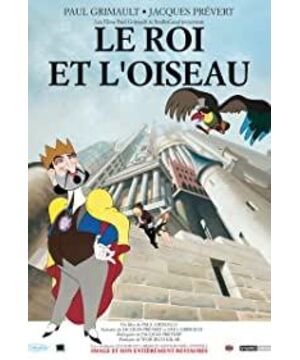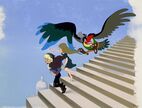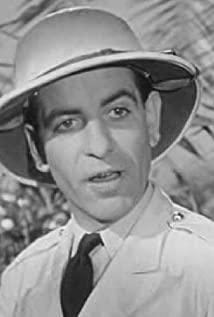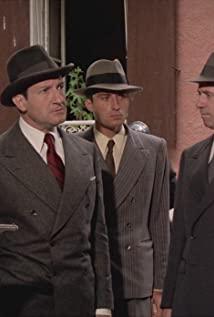The real name of this film should be called "Revolution, Fool and Ambitioner". That's right, that's the "adult theme" of The Bird and the King. The animation uses metaphors and symbols to tease the revolution.
Let's analyze the lines behind "Bird" based on the characters and plots in the animation.
King - a combination of a scumbag and a tyrant.
Regardless of whether he is involved in government affairs, if he arbitrarily executes the ministers around him, he will definitely not get the support of the upper class; for the people at the bottom, he adopts a high-pressure policy to force labor to exploit the surplus value, and of course he will not get the support of the lower class.
The king is the metaphor, then the incompetent and harsh government is the noumenon, and it is the root of the revolution.
The shepherdess and the chimney sweep - intellectuals who escaped from the system.
At first, they lived in the palace, and they eloped after falling in love with each other—a move that symbolized the imperial intellectuals' unwillingness to be shackled and no longer serve authority. They abandoned the temple, escaped from the system, and became free men.
But after freedom, all they care about is the love of their children—people who escape from the system are often reluctant to be involved in political disputes, and are more willing to put their love between landscapes and become so-called "celebrities". Such people have no deep hatred for the king or political ambitions, all they want is independence and freedom.
Parrot - careerist, demagogue.
Parrots are well-informed grassroots figures. It has traveled the world and is proficient in various languages. The life of Xianyun Yehe could have continued, but the king killed his wife and could kill his child at any time. The threat made it uneasy.
There is a detail in the film: the parrots put their nests on the spires of the palace.
The parrot does not serve the royal family, but relies on the side of the palace - the subtext is that grassroots intellectuals from the folk hope to be appreciated by the ruling class one day, but they often fail to get in, and they end up wandering in the system. people on the edge. Because of their unorthodox origins, they were not only not appreciated, but were insulted and could only complain about the government. They can't change the status quo.
They may seem weak and bullying, but when the time comes, they immediately become revolutionary leaders. The rulers, unaware of the dangers of such marginal figures, laid a hidden danger for their own rule.
Pet Dog - Revolutionary sympathizer among the upper classes.
The pet dog living in the system knew that the king was stupid and cruel, but neither had the courage nor the ability to overthrow him. They can only give the revolutionaries moderate help. But they will not give up their social status until the revolution succeeds.
To put it harshly, this is called eating inside and out.
Guard - Police and law enforcement.
They were faithful thugs, completely at the command of the king. There are two types of police, the ground and the underground. In terms of strength, the underground is undoubtedly stronger - the secret police, or secret agents, always have stunts - not to mention the elopement lovers who are not familiar with the world, and even the scheming ones. Parrots, were unable to escape their pursuit.
In addition to tracking down "political prisoners," they are also tools for ruling the lower classes. They strictly implement high-pressure policies and force them to work, and most of the products of their labor are taken away by the ruling class, leaving behind only for subsistence.
Although they possess unique skills, they are solitary individuals. This isolation determines that they can only be loyal to the ruling class and become the backbone of the system.
Underground dwellers - the toiling masses of the bottom, the idiots.
They are a blinded group, living underground and not seeing the sun. They have been brainwashed, accustomed to the exploitation of the king, have no sense of resistance, and have no revolutionary demands. About freedom, they are just hearsay - birds and sunshine exist only in the singing of blind entertainers.
They are exploited like this day after day. But if they are numb, they are also the most receptive type of people - they can accept tyranny, they can also accept the singing of blind artists, and they are not opposed to revolution - for the bottom, life has been so bad, Could it be worse?
Blind entertainers - free people at the bottom.
Blind art does not work like other underground dwellers. He escaped the enslavement of the rulers, sold songs on the street, and lived a free and poor life.
Unlike the free man represented by the parrot, the free man represented by the blind artist has no clear position. He is just an ignorant and fearless optimist who can play happily even in the lions. When the parrot was giving a seditious speech, he didn't understand what it meant, but just echoed it, and inadvertently played a role in fanning the flames.
And the couple who eloped, yearned for the life of a blind artist. Shepherdesses and chimney sweeps, even if they lived in the palace, were still people of the lower classes. That is to say, what they yearn for is the unfettered life at the bottom, for which they can give up material enjoyment.
Lions - blind strays, criminals, unemployed, the bottom of the bottom.
The king was not kind to the lions, often starving them. The hungry lion swarmed the living creature and became the king's accomplice unintentionally.
The lion is at the bottom of the bottom, and is strongly dissatisfied with reality. This class is usually ignored, but they are very aggressive, and once instigated, the destructive power is quite amazing.
The ambitious parrot took advantage of the characteristics of this class, and made extremely provocative and deceptive speeches under the signboard of "tell you the truth". He told the lions: The shepherdess' sheep was originally given to you, but now the king has taken the shepherdess away; as long as the king is overthrown, the sheep will be eaten!
The lions who didn't know the truth were very annoyed and felt that the king had violated their rights, so they rushed out of the cage and took to the streets.
But what about the success of the revolution? Do lions have sheep to eat?
I'm afraid I'll be put back in the cage!
Robots - the army.
The ambitious parrot understands that the lion alone is not enough. To make the king step down, he must control the robot! And the robot is not directly controlled by the king, it is controlled by the people in the control room.
The army is controlled by the person in control of the military. The parrot killed the person in control of the military and manipulated the army, and the palace was turned into rubble in an instant.
The army was originally used to consolidate the rule, but after the mutiny, it can immediately smash the original ruling class.
At the end of the story, the robot sits alone on the ruins of the palace - the revolution is successful, the tyrant has stepped down, but the country is also ruined, and reconstruction is comparable to subversion and difficulty.
The robot opened the cage, and the parrot's son flew out. This is the director's good wish - the new ruler can give freedom to the thinking person.
But, often, this is just a good wish. Going back to the opening credits, watching the ambitious parrot relish the riot, it feels more like irony.
View more about The King and the Mockingbird reviews











